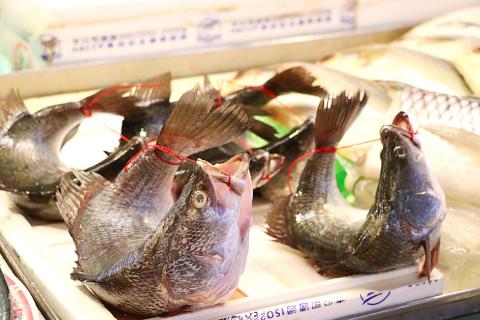Fish tethering — live fish being bound in a “U” shape to keep them fresh — causes unnecessary pain and poses a food safety threat, animal right groups said yesterday.
Asian sea bass, also known as barramundi, make up 70 percent of farmed sea bass in Taiwan, with information from the Fisheries Agency showing that about 10.35 million of them were sold last year.
The Environment and Animal Society of Taiwan estimated that 3.45 million tethered Asian sea bass were sold last year.

Photo courtesy of the Environment and Animal Society of Taiwan
Vendors tether the fish by puncturing the mouth and a gill and tying red string in the holes that loops around the tail, a painful process that prolongs the time they can survive out of water by eight to 12 hours before they die in terror, the group said.
Research has shown that pain causes the fish to generate additional lactic acid, which taints the meat, it said.
Fish should be “rendered unconscious or killed immediately after capture” to reduce their suffering, otherwise endocrine changes triggered by pain results in reduced meat quality, National Taiwan Ocean University associate professor of aquaculture Huang Chih-yang (黃之暘) said.
Bacteria in water sprinkled on tethered fish to help keep them alive can enter the wounds and contaminate the flesh, Huang said.
Taipei Animal Protection Office Animal Rescue Team leader Wu Ching-an (吳晉安) said that vendors who tether are not in breach of the Animal Protection Act (動物保護法), as they do not intend to torture the fish.
The authorities should extend humane slaughter rules to cover fish so that vendors would be accountable to those regulations, Wu said.
While tethered fish are a common sight at the Taipei Fish Market, the team has not received complaints, which shows that people’s awareness of animal protection needs to be enhanced, he said.
The Environment and Animal Society called on the Council of Agriculture to promulgate animal welfare regulations regarding farming, transportation, sale and slaughter of fish and to educate people on fish welfare.
Fisheries Agency Deputy Director-General Lin Kuo-ping (林國平) said tethering is traditional in Taiwan, but raising public awareness about fish welfare is a discussion worth having.
“Discussion over this issue would have to involve research and input from the government, industry and academics,” Lin said. “The Fisheries Agency will convene a meeting of experts to discuss the matter as soon as possible.”

ALIGNED THINKING: Taiwan and Japan have a mutual interest in trade, culture and engineering, and can work together for stability, Cho Jung-tai said Taiwan and Japan are two like-minded countries willing to work together to form a “safety barrier” in the Indo-Pacific region, Premier Cho Jung-tai (卓榮泰) yesterday said at the opening ceremony of the 35th Taiwan-Japan Modern Engineering and Technology Symposium in Taipei. Taiwan and Japan are close geographically and closer emotionally, he added. Citing the overflowing of a barrier lake in the Mataian River (馬太鞍溪) in September, Cho said the submersible water level sensors given by Japan during the disaster helped Taiwan monitor the lake’s water levels more accurately. Japan also provided a lot of vaccines early in the outbreak of the COVID-19 pandemic,

Kaohsiung Mayor Chen Chi-mai (陳其邁) on Monday announced light shows and themed traffic lights to welcome fans of South Korean pop group Twice to the port city. The group is to play Kaohsiung on Saturday as part of its “This Is For” world tour. It would be the group’s first performance in Taiwan since its debut 10 years ago. The all-female group consists of five South Koreans, three Japanese and Tainan’s Chou Tzu-yu (周子瑜), the first Taiwan-born and raised member of a South Korean girl group. To promote the group’s arrival, the city has been holding a series of events, including a pop-up

TEMPORAL/SPIRITUAL: Beijing’s claim that the next Buddhist leader must come from China is a heavy-handed political maneuver that will fall flat-faced, experts said China’s requirement that the Dalai Lama’s reincarnation to be born in China and approved by Beijing has drawn criticism, with experts at a forum in Taipei yesterday saying that if Beijing were to put forth its own Dalai Lama, the person would not be recognized by the Tibetan Buddhist community. The experts made a remarks at the two-day forum hosted by the Tibet Religious Foundation of His Holiness the Dalai Lama titled: “The Snow Land Forum: Finding Common Ground on Tibet.” China says it has the right to determine the Dalai Lama’s reincarnation, as it claims sovereignty over Tibet since ancient times,

Temperatures in some parts of Taiwan are expected to fall sharply to lows of 15°C later this week as seasonal northeasterly winds strengthen, the Central Weather Administration (CWA) said today. It is to be the strongest cold wave to affect northern Taiwan this autumn, while Chiayi County in the southwest and some parts of central Taiwan are likely to also see lower temperatures due to radiational cooling, which occurs under conditions of clear skies, light winds and dry weather, the CWA said. Across Taiwan, temperatures are to fall gradually this week, dropping to 15°C to 16°C in the early hours of Wednesday